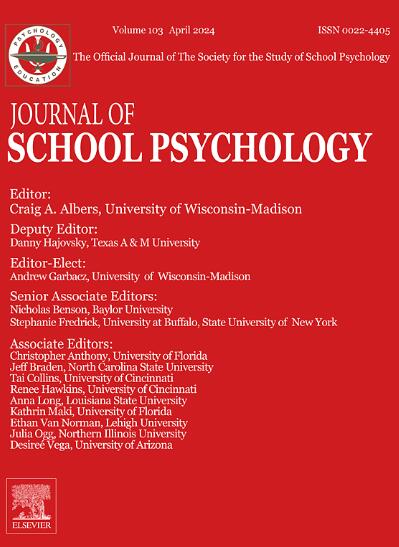Participatory reading research: Development and application of the bilingual reading intervention targeting tool
IF 4.1
1区 心理学
Q1 PSYCHOLOGY, SOCIAL
引用次数: 0
Abstract
Proficient reading is critical to support overall educational performance and is associated with higher graduation and employment rates and lifetime earnings, underscoring the need to ensure every student has access to quality reading instruction. Yet reading research, both basic empirical research as well as applied assessment and intervention research, has historically been largely monolingual and Anglocentric. There is little guidance for educators supporting young bilingual learners' reading skill development across diverse languages and cultures. Consequently, inaccurate perceptions of bilingualism as a deficit and limited access to appropriate biliteracy assessment and intervention contribute to poor reading outcomes for bilingual learners in U.S. schools. This conceptual paper aims to upend typical research processes with bilingual learners by embedding early reading assessment and intervention research within the language learning context of schools, allowing for the exploration of culturally and linguistically relevant questions via participatory action research in partnership with educators. To do so, the history of marginalization of bilingual learners in U.S. schools is explored. Next, literacy and biliteracy research from diverse fields of study is reviewed. Finally, a decision-making tool based on this interdisciplinary research base is proposed for linking reading assessment to reading intervention for early bilingual learners, with specification of steps to apply the tool within participatory action research partnerships. The purpose of disseminating the tool is to facilitate access to the complex field of biliteracy and to rapidly move research and evidence-based practices forward, centering bilingual learners and driven by educators who already work in bilingual contexts to overcome the typical limitations of research with bilingual learners.
参与式阅读研究:双语阅读干预目标工具的开发与应用
熟练的阅读对支持整体教育绩效至关重要,与更高的毕业率、就业率和终身收入有关,强调了确保每个学生都能获得高质量阅读指导的必要性。然而,阅读研究,无论是基础实证研究还是应用评估和干预研究,在历史上都主要是单语言和以英语为中心的。对于教育工作者来说,支持年轻双语学习者在不同语言和文化背景下的阅读技能发展的指导很少。因此,对双语能力的不准确认识,以及对适当的双语能力评估和干预的限制,导致美国学校双语学习者的阅读效果不佳。这篇概念性论文旨在通过将早期阅读评估和干预研究嵌入到学校的语言学习环境中,从而颠覆双语学习者的典型研究过程,允许通过与教育工作者合作的参与性行动研究来探索文化和语言相关问题。为此,本文探讨了双语学习者在美国学校被边缘化的历史。接下来,回顾了不同研究领域的读写能力和双语能力研究。最后,本文提出了一个基于跨学科研究基础的决策工具,用于将早期双语学习者的阅读评估与阅读干预联系起来,并详细说明了在参与式行动研究伙伴关系中应用该工具的步骤。传播该工具的目的是为了方便进入复杂的双语领域,并以双语学习者为中心,在已经在双语环境中工作的教育工作者的推动下,迅速推动研究和循证实践向前发展,以克服对双语学习者进行研究的典型限制。
本文章由计算机程序翻译,如有差异,请以英文原文为准。
求助全文
约1分钟内获得全文
求助全文
来源期刊

Journal of School Psychology
PSYCHOLOGY, EDUCATIONAL-
CiteScore
6.70
自引率
8.00%
发文量
71
期刊介绍:
The Journal of School Psychology publishes original empirical articles and critical reviews of the literature on research and practices relevant to psychological and behavioral processes in school settings. JSP presents research on intervention mechanisms and approaches; schooling effects on the development of social, cognitive, mental-health, and achievement-related outcomes; assessment; and consultation. Submissions from a variety of disciplines are encouraged. All manuscripts are read by the Editor and one or more editorial consultants with the intent of providing appropriate and constructive written reviews.
 求助内容:
求助内容: 应助结果提醒方式:
应助结果提醒方式:


